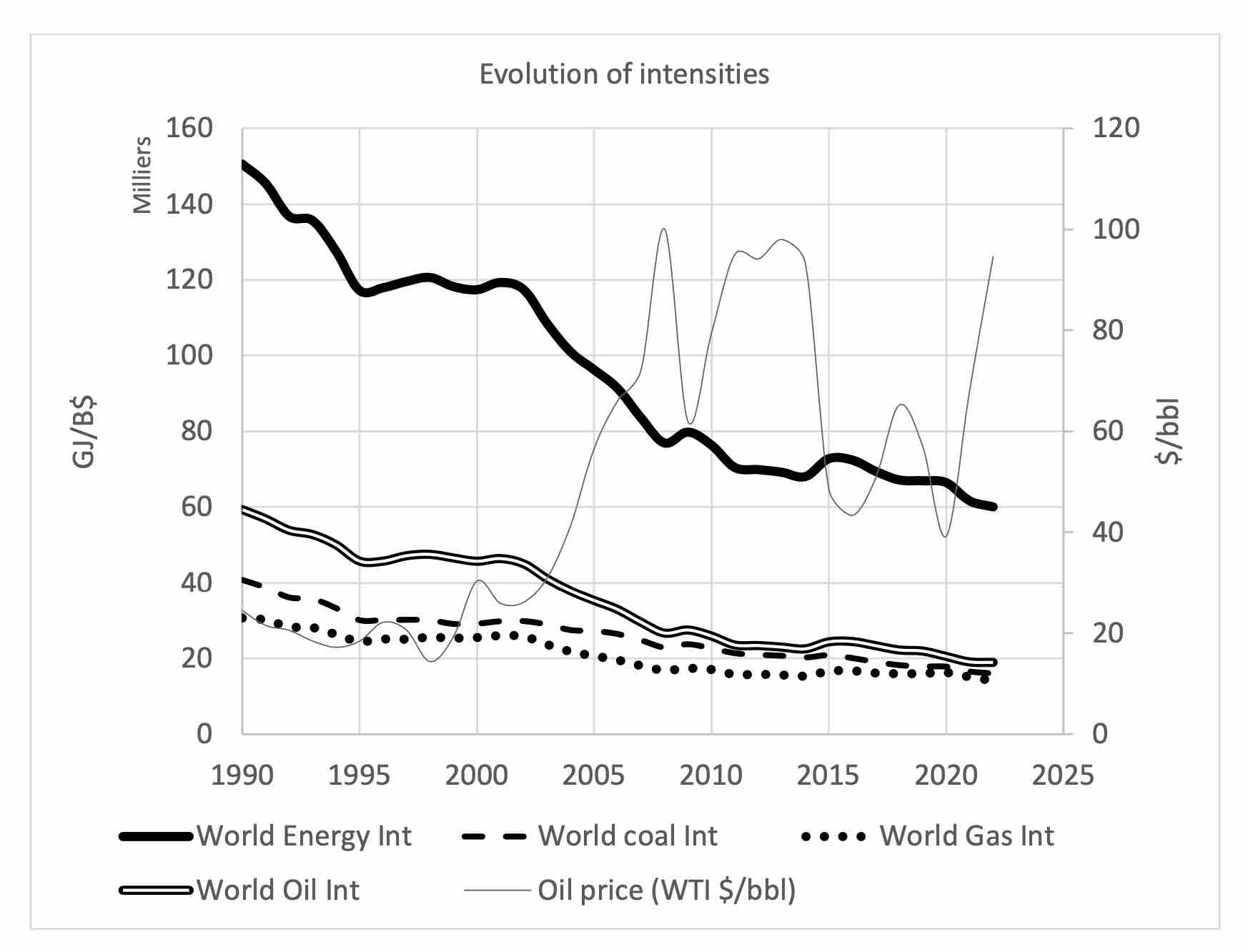Par Samuel Furfari, Université Libre de Bruxelles (Belgique)
A benchmark that explains why green NGOs want to promote energy sobriety
The fashion for saving energy, which assumes that human behaviour can compensate for the inelasticity of energy demand, is not new. Only the name is. In 1924, when US President Calvin Coolidge proposed saving oil because he had been told that reserves would soon be exhausted, he devised a strategy called energy conservation. Though compassionate and generous, these methods failed to reverse the continuing growth in energy demand. Energy consumption, and oil consumption in particular, continues to rise as the world’s population grows and more people need to eat and work, i.e. consume energy. It is the task of industry and engineers to make processes and products more efficient. It has always been an ongoing quest. The Romans used massive stones to build their bridges, creating amazing monuments. Today, a similar function is performed with much lighter materials. Efficiency is normal behaviour in human activities, including the production, conversion and consumption of energy.

The parameter used to assess this progress is energy intensity, which measures the energy consumed per unit of GDP produced. Its unit can be expressed in tonnes of oil equivalent per dollar or, better, in joules (or multiples of joules) per dollar. The figure below, which shows the evolution of energy intensity between 1990 and 2022, has been prepared using data from the World Bank for the GDP values, and the energy consumption statistics are those provided by the Energy Institute (2023 for 2022). The figure also shows the intensity for each of the fossil fuels.

The figure allows us to draw some deductions.
- World energy intensity has fallen dramatically. It has dropped from 150 gigajoules per billion dollars (GJ/B$) in 1990 to 60 GJ/B$, i.e. a reduction of 60% (-1.9%/year). There are many reasons for this improvement. First, energy prices have risen, forcing industry – and to some extent the residential sector – to reduce consumption. However, energy intensity should not be confused with energy efficiency. In fact, energy demand has increased throughout the period under consideration, only energy intensity has been drastically reduced. Second, technological improvements have made industrial processes or energy-consuming equipment more efficient, including in the automotive sector. Thirdly, the world’s wealth has increased substantially, so the ratio can only fall as GDP increases in the denominator. And finally, the share of the tertiary sector, especially services, in the economy is growing at the expense of the primary (agriculture) and secondary (industry) sectors. It is clear that the tertiary sector uses less energy than the others.
- Oil intensity logically followed the same trend as energy intensity. It fell from
60 GJ/B$ to 19 GJ/B$ over the period analysed, a reduction of 68% (-2.1%/year). Even if the differences in percentage per year between the different fossil fuels are relatively small, it is worth noting that oil intensity has improved the most among the fossil fuels. It is also the most expensive of them, which partly explains the reduction in intensity. The sharp decline from 2005 to 2010 corresponds to the oil price spike when OPEC abandoned the ‘price band’. The higher oil price improved the efficiency (from 45 GJ/B$ to 23 GJ/B$ during this period). However, the oil price spike in 2020 did not induce the same behaviour as of 2005–2010 because, on the one hand, continuous improvement is very difficult and, on the other hand, emerging countries are much more active than twenty years ago. - Gas and coal intensities have also decreased. Their improvement is -1.7%/year and – 1.9%/year respectively, but in absolute terms it is not as significant as the fall in oil intensity. Coal – the cheapest fossil fuel except in the USA – has a slightly better intensity than the others.
- Let’s note that the three fossil fuel intensities are tending towards a similar value, whereas they were quite different in 1990.
- The second clear message is that all fuel intensities are reaching an asymptote around 20 GJ/B$. This means that the low-hanging fruit is over and that we should not expect much improvement further. Technology has delivered what it can, processes will never reduce their energy consumption to zero, and societal behaviour has also reached a limit. Accordingly, scenarios and policies that aim for higher improvements in energy intensity and thus energy reduction are utopian for all fossil fuels.
Conclusion
At COPs, including the recent COP 28, many green NGOs have insisted that the solution to reducing CO2emissions is sobriety. This is understandable, as they have finally realised that there is no real solution to replace fossil fuels and nuclear energy, as it is now clear that renewable energy is not the solution that has been announced and proclaimed for at least 44 years. Green NGOs must therefore insist on reducing energy consumption by changing people’s behaviour, i.e. by changing the way of life in OECD countries. In a way, they make sense, because energy efficiency has reached its limit. We can no longer dream that insulating houses, for example, will deliver all the expected energy savings.
Of course, it will be interesting and financially beneficial for the inhabitants of the house (including their comfort), but insulation is not free: you have to produce the insulating materials (often based on the hated oil) and have them installed by workers, not to mention all the services involved in the operation, such as the energy used to transport workers and materials. All this may give the illusion of efficiency, but the real parameter for assessing the relevance of the operation is its impact on energy intensity at a macro level.
This short article shows that we are reaching an asymptote and that it is an illusion – at least in OECD countries – to believe that energy efficiency will lead to an overall reduction in fossil fuels and nuclear energy.
Unless we want to go back in time and live like our grandparents, energy consumption is only going to grow, and since renewables can only absorb part of this growth at best, demand for conventional energy will increase, as will CO2 emissions.
Merci Samuel pour cet éclairage rarement évoqué par ailleurs.
Effectivement ton graphique montre qu’il est illusoire de penser que l’efficacité énergétique peut indéfiniment croître, à moins que la science qui elle progresse toujours, crée les conditions d’un nouveau saut technologique.
Hello Samuel,
Thank you for sharing this graph showing the decline of energy intensity.
Howevdr the last sentence of your article is « demand for conventional energy will increase, as will CO2 emissions’.
Rather bleak prospects considering the current heating of the atmosphere and the tragedies that this brings.
You also write « Green NGOs must therefore insist on reducing energy consumption by changing people’s behaviour, i.e. by changing the way of life in OECD countries. In a way, they make sense, because energy efficiency has reached its limit. »
Shouldnt’ governments also insist on reducing energy consumption, ie. ‘selling’ sobriety? Anyway, for an increased part of the population, this sobriety is kind of imposed’ by less revenue (salary net increase, if any, ‘eaten’ by inflation, particularly on food products.).
Thank you for your comment.
The demand for conventional energy can only increase because, in many countries around the world, and not just in Africa, too many people are struggling to have a good quality of life . This is why COP 28 did not ban the use of fossil fuels.
You ask whether governments should « sell » sobriety. Some EU Member States are already doing this, but I can’t see the public being enthusiastic about it. Even if some citizens are prepared to follow them, this is a personal issue that can in no way have an impact on global energy demand. The meagre reductions in energy consumption achieved through sobriety are peanuts compared with the huge demand that Africa needs to lift its citizens out of poverty.
Je vous remercie pour vos nombreux articles que je lis toujours avec beaucoup d’intérêts.
Je partage avec vous la conclusion que les émissions de CO2 ne cesseront de croître pour les raisons que vous citez, mais je me pose tout de même une question, dont on parle peu, ou du moins qui est peu, ou rarement développée, et que j’aimerais partager avec vous.
La croissance des émissions de CO2, que vous annoncez très justement, est-elle un problème ou non et, dans l’affirmative, comment le gérer?
Certes, comme vous l’avez dénoncé à maintes reprises, « une Europe qui agit seule (réduction des émissions) se tire une balle dans le pied», et cela ne changera pas la donne de manière globale; mais alors que faire?
Manifestement, depuis 28 ans, les COP se sont révélées incapables d’infléchir la courbe croissante des émissions, alors quelle stratégie faudrait-il mettre en place, et en existe-t-il seulement une? Je pense notamment aux réflexions de JM. JANCOVICI qui invite à développer de « nouvelles boîtes à outils » (Interview de JM Jancovici par Natacha Polony 7/7/2023)
Cordialement.
Je vous remercie pour votre commentaire positif et encourageant. Vous demandez si l’augmentation des émissions de CO₂ est en soi un problème. Les activistes climatiques pensent que c’est le cas. La raison et la confiance en l’avenir conduisent à la position inverse. De nombreuses organisations et scientifiques appellent à mettre fin aux craintes climatiques qui ne sont pas scientifiquement fondées. Sur ce site Science-Climat-Energie vous trouverez même toute une série d’articles scientifiques montrant qu’il n’y a pas d’effet de serre dû au changement climatique ou que cet effet n’est pas catastrophique.
Pour ma part, je pense que quelles que soient les réponses à cette question, je ne peux pas me résigner à penser que le changement climatique rend les gens stupides. Partant, quels que soient les événements qui pourraient se produire dans le futur, ou même dans un futur lointain, l’homme sera capable de s’adapter. De plus, la croissance démographique conduira à plus d’intelligence humaine disponible, et avec les technologies modernes qui ne manqueront pas de se développer, il n’y a pas lieu de paniquer.
Je ne pense pas, sur base de modèles mathématiques, qu’il soit judicieux de changer notre modèle de société, qui nous a apporté la prospérité, la santé et l’hygiène.
C’est d’ailleurs ce que peut ce qu’on peut en déduire des conclusions de la récente COP28 puisque à part l’Union européenne les autres pays du monde vont continuer à utiliser des énergies fossiles.
Il faut cesser de raisonner dans le cadre où on nous enferme en permanence avec « l’effet de serre, le CO2, les émissions, l’empreinte carbone, les filières décarbonées »…j’en passe et des meilleures. Le CO2 n’y est pour rien, ou pour si peu que ça ne vaut pas la peine d’en parler. Il n’est plus temps de débattre dans ce cadre. Il faut changer de cadre. Qui cherche à nous culpabiliser pour notre mode de vie ? Qui cherche à détruire ce qui a fait notre civilisation ? Qui veut nous faire revenir à l’âge d’avant-guerre ? Ce sont ces « qui » les cibles désormais, ce n’est plus nous les gens normaux. Basta !